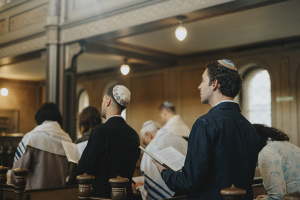The biggest danger of the 'Evangelical bro code'

Early on in my career, my immediate superior came to my office for an impromptu performance review. As he sat above me on the edge of my desk, he said that he didn’t feel I was living up to my potential. Instead of putting in the effort to perform at a higher level, he felt I was “getting by on my good looks and charm.” While I was indignant at the moment, looking back, I think he was on to something. I “looked the part” of someone who could be a leader in the organization. I had the “right” credentials and was learning to avoid (some of) the tripwires within the organization. My appearance, credentials, and aspects of my personality allowed me to “fit” within the organization in ways others didn’t. As such, I didn’t have to try as hard.
After some particularly difficult situations during my first year as an academic dean, I spent a year working with an executive coach. That year allowed me to reset professionally and personally. The coaching was a luxury to which many Christian leaders don’t have access or wouldn’t take advantage of if they did. My coach helped me rediscover my core values, understand what I really cared about, and change the way I operated within the organization. She helped me see that certain organizational dynamics weren’t doing me any favors. She also helped me see that I didn’t have to be captive to them.
Those organizational dynamics included but weren’t limited to the themes that surfaced in Katelyn Beaty’s Substack series on “The Evangelical Bro Code.” Beaty highlights three aspects of the “bro code”: 1. “Breadwinner Bias (unfair pay, deference to men supporting their families)”, 2. “Billy Graham Rule (sexual propriety and double standards)”, and 3. “Bullying (abuses of power, emotionally unstable male leaders).” Beaty’s work highlights some of the obstacles women face in Christian organizations. But these obstacles also create problems for men in Christian organizations. The themes Beaty identifies in the “bro code” and other dynamics can deform men in Christian organizations. To understand how these dynamics can deform men, we need to recognize that 1. organizations (even Christian organizations) can oppose conformity to Christ’s image, and 2. matching the organizational type often allows for bad behaviors of various sorts.
First, Christian organizations (like all other organizations) develop what Hogg and Reid call “fuzzy sets, not checklists, of attributes (e.g., attitudes and behaviors)” used to “define one group and distinguish it from other groups.” To illustrate the point, consider the differences in body style and attitude one might expect amongst gymnasts and a center in the NFL. Both need to be competitive in some sense. They need unique mixes of strength, flexibility, and coordination. The nature of the sport and what is required to win demands that athletes adopt certain mentalities and cultivate particular skills. The sport and position condition the formation of the athlete. In a similar way, the “fuzzy sets” within organizations tend to encourage conformity to organizational norms even when those norms hinder one from conforming to Christ’s image.
While most Christian organizations would not intentionally set out to hinder one’s discipleship, organizational dynamics have an inertia all their own. As such, the pressure to succeed and advance often requires a curtailed faithfulness or a way of being faithful that does not disrupt organizational norms. As such, organizations often promote a sort of anti-discipleship in which only certain forms and expressions of Christian character are “rewarded.” The “Evangelical bro code” creates a situation in which men are encouraged to become competent at conforming to organizational norms and, perhaps, little else. To the extent that specific men are capable of and have an interest in embodying the prototypical “company man,” they can serve as obstacles to becoming disciples of Christ.
Second, embodying the organization’s “fuzzy set” of characteristics covers a multitude of sins. Because those who more closely resemble the organizational ideal are often given greater license to bend (if not break) community norms, accountability, if it is present at all, is often focused on “big issues” like sexual misconduct (or the perception thereof), financial malfeasance, divorce, and various other more “tangible” sins. Limiting accountability in this manner not only allows organizational leaders or prospective leaders to more easily pass the buck for their failures to less prototypical members of the organization, but it also excuses them from the sort of critical feedback that would push them to grow. To the extent that many of these leaders are men, men are allowed to be immature.
The general idea is that when the “Evangelical bro code” and associated notions are present, Christian women are not the only ones disadvantaged. Christian men are also disadvantaged because the standards of the organization will never align with the standard of Christ. Any misalignment leaves room for deformation. Perhaps the biggest danger of the “Evangelical bro code” is the way it hides or justifies such deformations. If the bro code becomes normal, we will have lost one of our greatest impetuses for transformation — discomfort. We will unwittingly (at best) contribute to, enjoy, and safeguard disorder.
We need to be made aware that something is wrong so that we prepare to endure the pain of moving toward something right. Such endurance is not inactive. Corrections can and should be made. At the same time, we are fools to think that we can make a change without causing some unintended consequences for ourselves or others. We must develop a sensitivity to the ways the world is not right and refuse to resign ourselves to our failings. At the same time, we must acknowledge that the world is not ours to fix, but to suffer. As such, we must also cry out in anguish and hope as we wait for God to restore all things.
For more on the “bro code,” click here to listen to Dr. James Spencer’s recent interview, “How Should Christians Think about the ‘Bro Code’: A Conversation with Katelyn Beaty,” on his podcast “Thinking Christian.”
Dr. James Spencer currently serves as President of the D. L. Moody Center, an independent non-profit organization inspired by the life and ministry of Dwight Moody and dedicated to proclaiming the Gospel and challenging God’s children to follow Jesus. He also hosts a weekly radio program and podcast titled “Useful to God” on KLTT in Colorado. His book titled “Christian Resistance: Learning to Defy the World and Follow Jesus” is available on amazon.com. He previously published “Useful to God: Eight Lessons from the Life of D. L. Moody,” “Thinking Christian: Essays on Testimony, Accountability, and the Christian Mind,” as well as co-authoring “Trajectories: A Gospel-Centered Introduction to Old Testament Theology.”




























